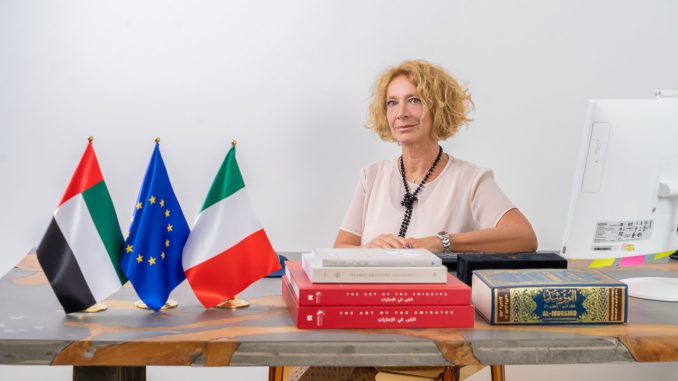
‘The fashion crisis in a pandemic era and the challenges of e-learning and smart-working’
The Italian Cultural Institute Abu Dhabi to host the next in a series of webinars
* The Italian Cultural Institute Abu Dhabi will hold its next series of webinars on topical cultural matters in October
* A body of the Ministry of Foreign Affairs and International Cooperation (MAECI), IIC’s October’s schedule will see webinars which will focus on fashion, e-learning and smart working
* The webinars – to take place throughout 2020 – aim to put technology and culture experience in dialogue in a post-pandemic era and is one of the many initiatives by the Italian Cultural Institute Abu Dhabi to continue to bring knowledge to the public during times of crisis
Abu Dhabi, 5th October 2020 – Access to a particular type of event, such as a fashion show, can change and evolve in its modalities, for better or worse. The same applies to the working field, including teaching. What will become of catwalk shows and traditional classroom learning in a post-pandemic world?
This will be addressed by the Italian Cultural Institute Abu Dhabi in October as it hosts its latest webinars addressing topical issues such as fashion shows and education.
Bringing Italian language, arts and literature to the Emirates, the Italian Cultural Institute Abu Dhabi, a body of the Ministry of Foreign Affairs and International Cooperation (MAECI), is a cultural hub in the UAE’s capital – responsible for spreading and promoting the Italian language and culture to the UAE’s richly diverse nation.
As part of its ongoing mission to integrate Italian and international cultures and knowledge, the cultural body will continue next month with two new webinars featuring, once again, an international lineup of experts on prevalent cultural experiences of human existence.
October’s first webinar – to take place on October 13 – is entitled ‘_Fashion and the senses’ _and will feature guest speakers Chiara Tronville, fashion journalist, storyteller and communication specialist (Milan); Budreya Faisal, fashion designer (Abu Dhabi); spokesperson from Unusual 9076 – an Italian modest street-style brand; Amal al Raisi, fashion designer (Muscat, Oman); Pamela Berry, art and creative Director of _D Magazine_ – a weekly fashion magazine from _La Repubblica_ (Milan).
The industry’s annual glittering showcases of the latest collections are similar to a live event, nevertheless they deserve a separate discussion given the world of fashion’s unique flexibility in nature.
How did the pandemic impact the fashion industry? Will designers opt to show their ware digitally once things will return back to normal, giving up traditional showcases?
‘_Fashion and the senses’ _will try to address these topics and present some answers from experts and artists within the field.
On October 27, the webinar_ ‘E-learning and smart working: an assessment’ _will give an overview on how schools and universities have suddenly resorted to e-learning, with office work being replaced by smart-working: what are the challenges in view of the forthcoming years?
The opinions of operators and specialists are strongly conflicting: some say the remote dimension is indeed the best future scenario, while others complain of discomfort, in terms of individual work performance and the well-being.
Guest speakers are Carlo Ratti, architect and engineer, Professor and Director of the Senseable City Lab at the Massachusetts Institute of Technology (USA); Francesco Ramella, Professor of Economic Sociology (University of Turin); Michele Rostan, Professor of Economic Sociology (University of Pavia); Hind Al-Rostamani, Assistant Deputy Rector – Deanship of Student Affairs (Zayed University, Abu Dhabi); Pasquale Borea, Dean College of Law, Royal University for Women (Bahrein).
As part of the Institute’s ongoing mission to bring art, fashion, food, and other cultural experiences, to the public – even more critically in a post-pandemic-19 era – the webinars will allow online guests to either watch webinars as they are broadcast live or catch up post-event.
A further line-up of webinar topics to take place in November and December will be revealed in the coming weeks.
Dr. Ida Zilio-Grandi, Director of the Italian Cultural Institute Abu Dhabi, Embassy of Italy to the United Arab Emirates, said: “Cultural and creative sectors are not only a vital part of the economy but also an essential contributor to innovation and to a positive social impact, such as education and well-being, and yet they are among the hardest hit by the pandemic.
“Therefore, it is vital we keep an open debate on how culture and the arts – and the many diverse and dynamic areas these sectors encompass – will adapt, survive and will possibly develop in a post-pandemic world.
“Impacted by the pandemic, the fashion industry was, in 2020, forced to change its annual agenda, notably its many fashion shows initially scheduled throughout the year, with many designers cancelling the traditional runway shows. But going forward, how will fashion houses present their collections? Will the world of fashion continue to believe in the vital endure of live interactions?”
“We recently witnessed radical changes within education, as learning went virtual. Although technology’s quick response allowed education to move forward, there are many critical aspects that remain unsolved, such as the importance of the physical presence during the learning process and the emotional aspects connected to the teacher-student and fellow students relations”.
“We at the Italian Cultural Institute Abu Dhabi want to continue to tackle these debates – some of the most relevant topics facing our industry at the present time – as we reinforce our commitment in involving our audience in experiences that are topical, informative and challenging.”
Participants to the webinars can join via ZOOM, using the following registration link or tune in via the link HERE [1], where the webinar will be broadcast live and then available to view at any time.
For more information, please visit the website https://iicabudhabi.esteri.it/iic_abudhabi/en [2].

Be the first to comment